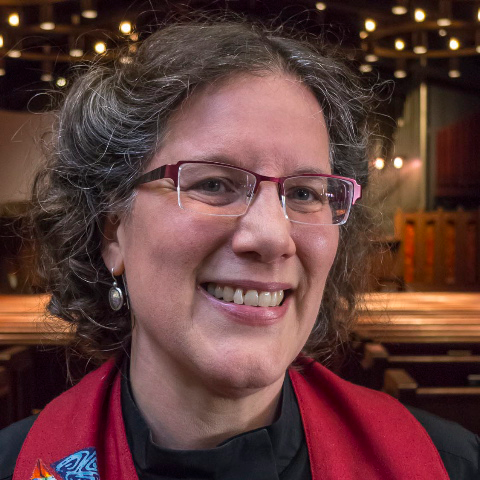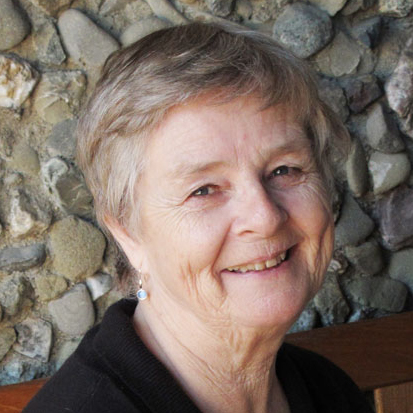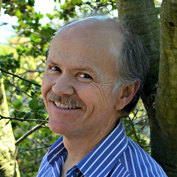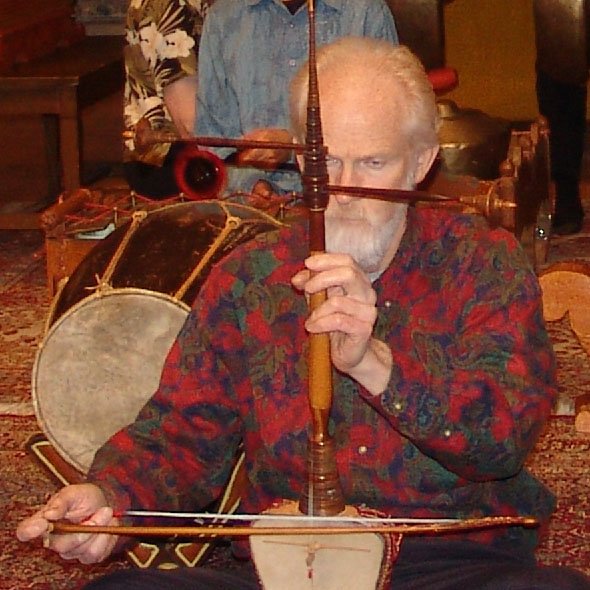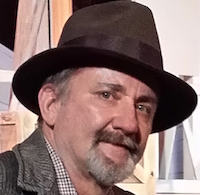REFLECTION
Elizabeth Kubler Ross – forged a career helping people understand and cope with death. She noticed that people who can’t understand or cope with death get stuck in certain feelings – like anger or resentment. And their lives become small and ordinary.
She tells a story about a patient she worked with who was dying. Jeffie was a 9 year old boy who had lived with Leukemia since he was three. Even the simplest things we take for granted were difficult for him. Like standing… or walking. He yearned to be like others. And he admired his younger brother, Dougie, almost five, who he saw as so energetic and strong. Dougie played with Jeffie a lot – but much more gently than Jeffie knew he could play – so as not to hurt Jeffie.
Jeffie spend a lot of time in hospitals. Doctors tried all kinds of medicine to help him get better. But none worked. Sometimes the medicines they tried even made him feel worse. But Jeffie’s parents wanted so much for him to get better they encouraged him to keep trying new medicines.
One day, shortly after the last medicine they tried failed miserably and Jeffie got very sick, Kubler Ross came to talk to Jeffie about the next regimen of medicine his parents wanted him to try. A graven look came over Jeffie’s face and he appeared ready to cry. That began a series of conversations where it became clear that Jeffie ‘knew’ what his body was saying… and he wasn’t afraid to die. But he was afraid for his parents. He just wanted to go home. And he wanted Kubler Ross to be with him when he got home. He said he had something he needed her to do.
After much talking and tears, Jeffie convinced his parents, and Kubler Ross accompanied them home. Jeffie stared out the window the whole way in anticipation. When they pulled into the garage, he saw what had been calling him. On the wall of the garage was the bike his parents had bought for him when he was five to encourage him to get better. But he’d never been strong enough to ride it.
He asked his father to take the bike down and put on the training wheels. With tears in his eyes, his father did so. Then he said, with a lively energy they rarely saw in him, that he was going to do the one thing he’d always dreamed of doing: riding his bike around the block. Then he looked to Kubler Ross with a mischevious grin and said, ‘the reason I need you here, is to hold my mom back.’
Kubler Ross held his mom, who held his dad, and Jeffie took the most anticipated and seemingly impossible trip around the block. When he returned, he was beaming. He then ordered his father to take off the training wheels, clean up the bicycle, and bring it in the house, which he then proceeded to give it to his brother Dougie – on the condition that he never ride it with training wheels. Two weeks later, Jeffie died.
SERMON:
Today, is Palm Sunday. And Palm Sunday is always hard. At least for those who know what it’s asking of us.
Palm Sunday, as you might know, is the story of a parade. A triumphant ride around the block. But, because we know what comes after the ride, it’s really more than that.
Palm Sunday is about a deliberation. A soul-full conversation between the part of you that feels ready for a parade; even when part of you that recognizes where the parade is headed. It is a story about choices.
But, of course, that’s not the way Palm Sunday is advertised. In thousands of churches all around the country this morning, Palm Sunday is proclaimed with a jubilant expectation.
Many years ago on Palm Sunday, when I served the church in Atlanta, I opened the Sunday paper to the religion section and noticed ten churches within ten miles were offering re-enactments of the story of Palm Sunday. Right across the street, in fact, from my church was Lebanon Baptist Church which boasted 10,000 members. They’d taken out a full page ad asking people came to join in singing ‘Hosanna’ and shouting for joy. So I went to the early morning service. They brought in a live colt to carry a very light skinned, blue-eyed Jesus with disciples aplenty whooping it up alongside. They brought old coats and palm fronds to lay on the path before Jesus as he rode by. It seemed like a celebration. But I kept wondering if those who entered Jerusalem with Jesus felt like celebrating.
Jerusalem, at the start of the first century had about 80,000 people, on any given day. But the day Jesus arrived with the disciples marked the beginning of Passover, so, the population probably quadrupled from all the people who gathered to celebrate the festival in the Jewish city. The Roman guards and Jewish priests both had a great stake in keeping the peace and not riling up the crowds. Authorities didn’t need a reason to crack down on anything that looked like it could get unwieldy. Detainment, torture and even crucifixion were commonly practiced by Romans demonstrating their authority, deterring anyone from acting out. If you lived around that time would have known to be extra careful. Certainly the disciples would have known.
On top of that, the book of Mark tells us that while on the road to Jerusalem, Jesus took the twelve disciples aside and began to speak frankly to them about the events that were about to unfold. He prophesied his impending arrest – telling them he would be turned over to the ranking priests and Roman authorities. That they would argue over his fate, taunt and ridicule him, spit on him, flog him, drag him through the streets and crucify him. And then he told them, “the cup from which I’ll be drinking, you’ll be drinking. And the baptism I’ll be undergoing, you’ll undergo.”
It was, to say the least, a lackluster marketing pitch for becoming a disciple.
But the scriptures do not describe any hemming or hawing. It only describes loyal followers. But you have to figure there was ‘cause for pause.’
Nevertheless, scripture describes the disciples joining the crowds, laying down their coats and palm fronds and singing, ‘Hosanna.
“Hosanna,” from the Hebrew, is a shout of exultation and praise. But it’s important to know that it has a double meaning, according to Semitic scholars, it is also plea for deliverance. It is often translated as, ‘save us now.’ The disciples, like other people of their time certainly felt the tyranny of the times and felt, themselves, powerless to change their circumstance. They longed for someone to step up and ‘be the change they wanted to see.’ Perhaps they were ready. Each ready to trade their ordinary life for a life less ordinary.
2000 years later, this is still true. Any one of us can probably look around at our personal circumstance and feel the challenges pressing upon us. And, if we’re really honest, we could probably feel some of the yearning the disciples must have known… The yearning for a leader who could change tribulation to triumph. The yearning to scan the horizon and see the next Nelson Mandela, Mahatma Gandhi, Rosa Parks, Martin Luther King – maybe even the next minister – who could change the daily grind we’ve felt into a some kind of palpable hope?
<><><>
For twenty-one years, Palm Sunday has been an important gut-check for me. Twenty-one years ago this week, I walked into the administrators office at the Pacific School of religion and handed over my application to enter seminary. And I still remember the feeling of trepidation. Part of me jubilant, excited and confident about joining the parade. Part of me wondering if I was out of my mind.
And then, in what seemed like the very next moment, sitting in a circle 40 other new seminarians on campus in the ‘Chapel of the Great Commission’ for orientation. I sat there, terrified, a Unitarian Universalist staring at a 40 ft. cross suspended from the ceiling, praying, ‘please don’t ask me why I’m here. Please don’t ask why I’m here.’ Just as the dean of students, Ardith Hayes, came into the chapel, smiling, welcoming us and saying, ‘now tell us why you’re here.’
I had never really knew what a ‘call story’ was. But that morning I heard 40 of them. Powerful call stories. Burning bush call stories. Thunderclap announcement from the heaven call stories. All of which left me feeling rather inadequate and unprepared. The story I shared was one that began 25 years earlier about the week leading up to Easter. And it was a story of my Unitarian church’s mystery buddy program.
When I was seven, my minister, Tom Owen Towle, designed a special mystery buddies program right before Easter. He made and hid Easter baskets around the church – really nice ones. And he told me that there was one hidden somewhere over by the sanctuary. I’m seven, right? Treasure hunts were my thing. It was clearly a set up.
When I found the basket I was amazed by its size – and elegance. There was a little candy on top, but underneath it had expensive jams and jellies and adult-like lotions. It also had a card – with someone else’s name on it – Mildred Manchester. When I brought it back, confused, it was explained that the candy on top was for me – IF – I helped deliver the basket to one of the shut-ins at the church. Tom said that he thought Mildred would appreciate my exuberance and vitality. I hesitated. It seemed like work. And I already felt a little uncomfortable.
My life at the time was a little uncertain. My parents were getting divorced. I was constantly fighting with my older brother. My house was filled with tension and conflict. My secret hope was that someone would come along and save me. I had no real inclinations to save someone else. I didn’t know anything about what to say to old people… especially if they were sick. My life was already uncomfortable. Why go? I thought. But Tom – like Jesus and every other minister I’ve ever known – had a way of talking me into things. He eventually got me to go.
I felt unsure as we drove over to see Mildred. I asked Tom on the way over, what was wrong with Mildred. “She’s very old,” he said. “Is she sick?” I asked. “Yes.” “Is she dying?” I asked. “Not today. But, yes, she is dying.” Suddenly, I became sure of at least one thing: I was sure I was terrified.
Entering the bedroom I was overwhelmed by an unfamiliar stale smell. I had never been so close to someone so old and frail. When she saw us, she smiled. But the look in her eyes was clearly one of uncertainty. Tom sat down on the bed next to her. I stood next to him silently, wishing I were somewhere else. He prompted Mildred to share a little about her life with me. And when she did she spoke of her husband, who’d died some years back, daughters and grandchildren, loneliness and wondering what would happen next. Tom talked a little bit about the church and the people in it. And then he asked me to share about my life.
I can’t remember what I said. But I can still remember how intently they both listened. I remember seeing Tom holding Mildred’s hand and feeling his other hand on my shoulder. I remember feeling the tension I carried with me into the room slip away. I remember Tom squeezing her hand and pulling me closer to him, saying, “It will be okay. We’re all in this together.” And I remember, just before we left, feeling relieved, but not because we were leaving.
Over the course of the next few months I went with Tom to see Mildred a few more times. Each time I could feel the fear and the “overwhelm” lessen. In her and in me. Each time I went, we found that we had things to talk about and it became easier. I felt a little more comfortable being uncomfortable.
Mildred became sick shortly after that and Tom stopped asking me to go with him. I wondered about Mildred. It was like I had begun to carry her around with me wherever I went. I knew her struggles. How much effort it took her to be brave. I knew some of her scars. Somehow, in the exchange of stories, ‘she’ had become ‘we.’ There was no more, ‘her.’ Only ‘us.’ Then, one Sunday, Tom took me aside and said Mildred had died. I was very sad.
What I shared with my new colleagues that first morning of seminary were my reflections from that experience. Looking back, I realized that during that time while I was searching for my own bravery, my parents still divorced. I still felt uncomfortable. And lonely. There was still loss and grief. But something did change. And that was me.
I realized that even though I couldn’t always choose my circumstances, I could choose how I might respond. And to one degree or another that choice was whether I would face my challenges with love or fear.
<><><>
When the disciples got close to the entrance of the city, they knew the danger. They heard the premonition. They could see the nervousness of the authorities. And as Jesus got up on to the little colt and the cloaks and palms began to line the street, and the voices started to rise up, three choices became obvious:
They could have turned and walked away.
They could have stayed and watched the parade go by.
Or they could have laid down their own cloaks, steadied the little colt and sung for all they were worth.
Let me emphasize that these were not easy choices. …it is sometimes okay to just stand and watch. To pay attention and learn from the holy as it passes by.
But it is my belief that our greatest regrets in life come from listening to voices of fear and following their call to safe, ordinary lives rather than following the call to a life less ordinary. It is much more common to wake up, one day, wishing a voice would beckon us to that place where sparks fly: where our deep commitment and the world’s deep need come together. Who doesn’t want what Jeffie wanted: to take that ride around the block and experience that terrifying mystery at least once before it’s all over?
That is why this Palm Sunday sermon is about the third choice. The choice to remove our cloak. To lay down palms. To steady those around us. To sing out. This sermon is about these ordinary things. Doing them even in the face of discomfort. It is about choosing to follow what calls us even though danger and suffering have been foretold. This sermon is about what the disciples faced… and what we all face in the choice to live a life less ordinary.
Twenty-one years ago, I handed my application to the administrator to enter seminary. The jury is still out about whether I was out of my mind. I remember then feeling I wasn’t qualified. I wasn’t skilled enough. Or sensitive enough, or strong enough… like I wasn’t smart enough, or caring enough or bold enough to be a minister. From time to time I still have those questions. But Mildred and Tom taught me what might be possible if I could imagine being a little more comfortable being uncomfortable. What was possible – I realized – was to show up with a little courage and a lot of faith… show up for Mildred, show up for seminary… show up in my life! I realized the only thing truly impossible to believe was the fantasy that all the discomfort in my life would suddenly end and my real life would then begin.
Leaders, both famous and ordinary, inspire us not because they don’t have fear. None of them were born great. They simply chose greatness when it called. When they answered their call, they were given no more than ordinary gifts: the ability to lay down their cloaks, steady those around them, and sing out. You have those gifts. Every one of you.
Ten years ago, when I received final fellowship in the ministry, Tom Owen Towle was there to celebrate with me. I mentioned that part of my call came from the time he spent with me and the time we spent with Mildred. He responded by telling me something important. “I didn’t ask you to go visit shut-ins because Mildred needed you,” he said… “Or because I needed you. I asked because you needed you. You needed to go. You needed to be there to discover what you had to offer.” He was right.
You may know the story of the 18th century Hasidic rabbi named Zusya. Just before his death, Zusya speculated that the question he would be asked by the saints at his life’s end would not be, “Why were you not Moses?” or “Why were you not Elijah?” They would simply ask, “Why were you not Zusya?”
Life doesn’t begin when discomfort ends. Life begins when we answer the call that serves as a response to our discomfort. Not only for others. But for ourselves.
It will be hard. Part of Palm Sunday is learning that you have gifts to offer, even in the toughest of times. Sometimes they are only discovered because the toughness of the times demands them. And when the times get toughest and love stands on the far side of trial, remember what the disciples must have realized. “It’ll be okay. We’re in this together.”
May this understanding help us all answer the call to a life less ordinary. So that when the parade begins, we can lay down our cloak, steady those around us and sing for all we’re worth.
To the Glory of Life.







